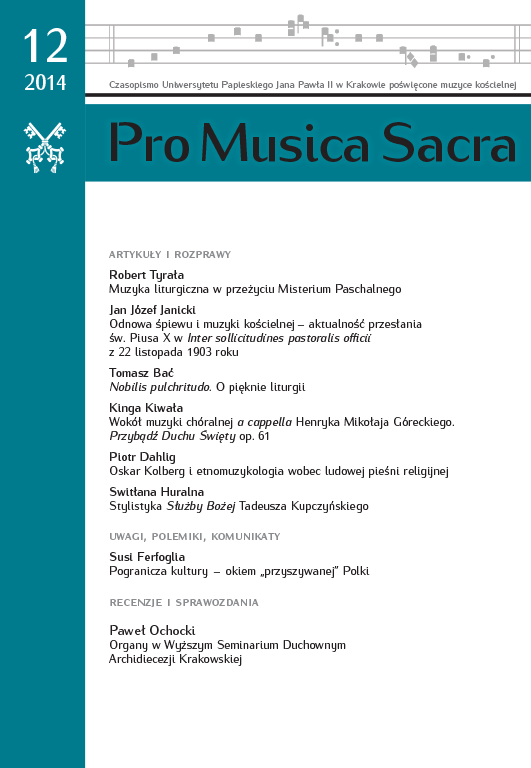Doświadczenie i ewolucja greckiego ideału piękna w koncepcji Pseudo-Dionizego Areopagity. Artysta jako pokorny hymnograf
Experience and evolution of the Greek ideal of beauty in the concept of Pseudo-Dionysius the Areopagite. Musician as a humble hymnist
Author(s): Grzegorz MiśkiewiczSubject(s): Christian Theology and Religion, Philosophy, Music
Published by: Wydawnictwo Naukowe Uniwersytetu Papieskiego Jana Pawła II w Krakowie
Keywords: names Plato; Plotinus; Pseudo-Dionysius the Areopagite things; Beauty; Goodness; Truth; philosophy; Christianity; art; music; idea;
Summary/Abstract: Beauty, as one of the key concepts of classical philosophy and affirmed by Christianity, is subject to further evolution. In its hierarchy, as Plato stressed, it rises from the physicality through actions and laws up to the truth that reveals beauty in and of itself – unchanging and eternal. Plotinus believed in the beauty of things from their presence in the ideal, which is true Oneness. Higher areas of beauty can be seen only by the soul. The culmination of Beauty as recognized Plotinus is the highest Beauty and the supreme Good in itself that gives everything and loses nothing. According to the theory of emanation, beauty also passes into deeds and cultivated activities, especially art, which as a tool portrays and reveals the essence of things. Participation in giving form to eternal beauty is possible because a man, an artist, has a vision of eternal ideas. Plotinus established a hierarchy of those, who because of their predispositions are able to advance and discover the beauty of the divine mind: musician – aficionado – philosopher. This three-stage initiation was transformed by Pseudo-Dionysius into the concept of the celestial hierarchy and the Church hierarchy. Together, they form the way to know God’s Truths. Highest beings receive the doctrine of God’s miracles by means of illumination. Next, they pass it down to the lower hierarchies so that they can glorify and receive God according to their predispositions. In this way, says Dionysius, the texts of the Bible provide the people with hymns, sung by the angels of the highest hierarchy in which was revealed the greatness of their extraordinary light. Hymns and canticles which are sung by the Church are a reflection of the spiritual hymns from the celestial hierarchy. According to Dionysius, any other being participates in beauty because it comes from God, and therefore it can become a source of the most profound contemplation. The concept of Plotinus implies breaking down barriers in the quest to catch a glimpse of beauty, suitable to lead both the musician, the artist, and the lover, so that they can see the true beauty. For Dionysius, the musician is a recipient and utterer of the beauty which is contained in the eternal, heavenly hymns. His faith makes him a tool of God, and he becomes a humble hymnist.
Journal: Pro Musica Sacra
- Issue Year: 12/2014
- Issue No: 12
- Page Range: 91-102
- Page Count: 12
- Language: Polish

